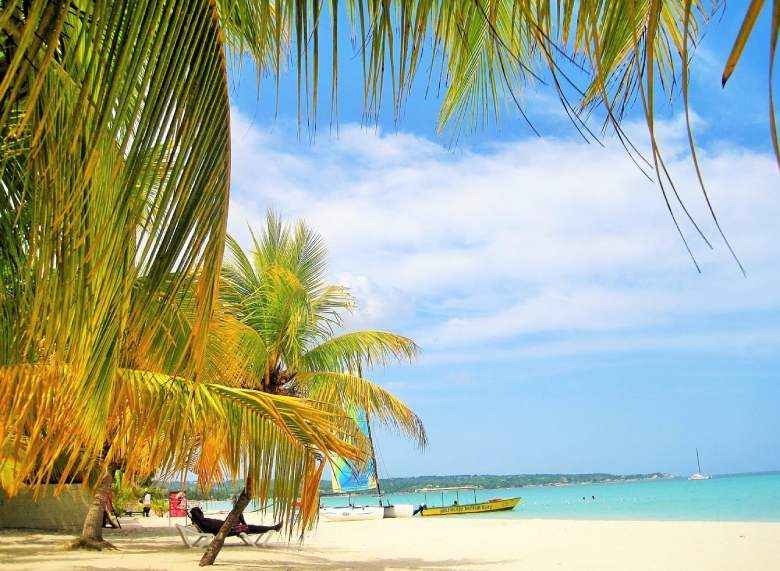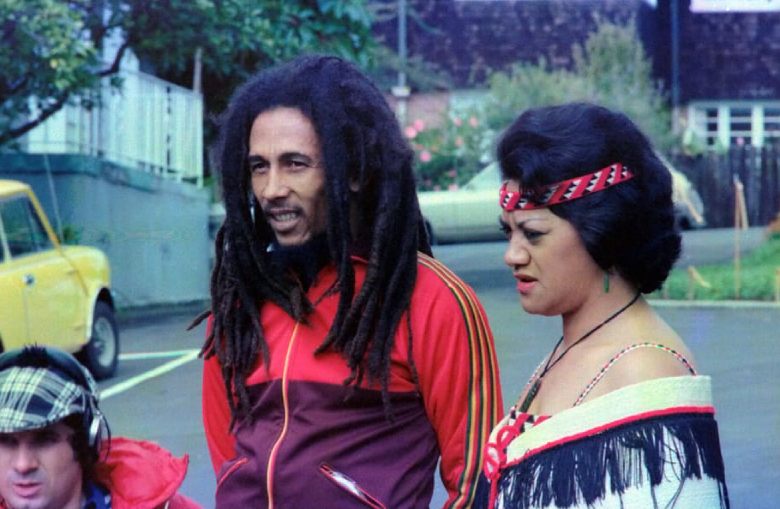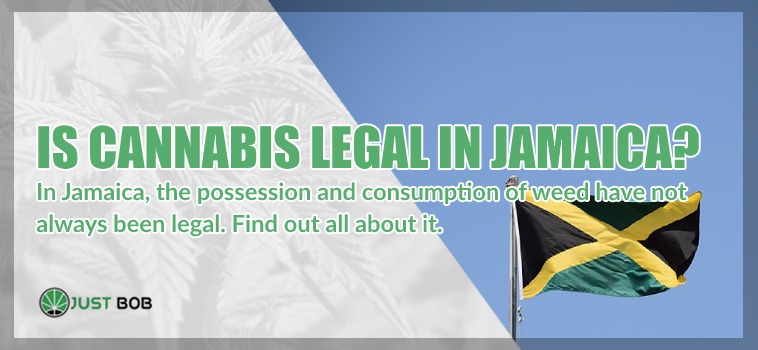Modified on: 22/01/2024
IN JAMAICA, THE POSSESSION AND CONSUMPTION OF WEED HAVE NOT ALWAYS BEEN LEGAL. FIND OUT ALL ABOUT IT.
Jammin ‘, jammin’ … Jamaica, for many, is the destination of dreams: reggae music, enchanting beaches and of course, legal marijuana and hashish.
The truth, however, is that we must retrace the long history of marijuana legal this Caribbean island to know its period of closure and prohibition that characterized it for so long (1913-2015); and which ended with indeed more liberal laws, in force all ‘today.
To explain the marijuana situation in Jamaica, let’s start with a bit of history.

The “first cannabis ” in Jamaica.
The history of the Caribbean island is characterized above all by oppression and slavery suffered by the British Empire. cannabis, however, was imported by Indian servants from the mid-nineteenth century.
The first cannabis seeds from India will, therefore, be the ones that will give way to a thriving culture of smoking the marijuana plant. Thanks to the fusion between these two civilizations, the herb will become popular, especially among the humblest classes.
It has been estimated that consumption is quite high among men, women and children belonging to rural castes: 70% used grass; although many studies show that, even today, its use has spread wider than before.
The influence of India in Jamaica is also evident. From a careful analysis of the term “Ganja”, we can see that it comes from Sanskrit origin, and it can be translated, precisely, as “hemp”.
Read also: Legal marijuana tea: preparation, benefits and (if any) contraindications
The birth of Rastafarian culture in Jamaica.
The consumption of marijuana in Jamaica is consolidated since 1920 when a group of religious began to profess their creed, the Rastafarianism, on the island.
This movement originates in Ethiopia from the Emperor Ras (“head”) and Tafari (“the honoured”). The emergence of this new culture was followed by the consolidation of that of cannabis, considered fundamental during religious ceremonies.
The Rastafarians, in fact, during meditation or the so-called “reasoning sessions” smoke in a circle the “holy” herb to generally discuss moral issues. One of the most interesting characteristics of these functions is that the passage of marijuana is done counterclockwise to get in touch with “Jah”; the only God they worship.
The use of weed is not only related to the ability smoke marijuana to alter the mind, but according to devotees of Jah worship, it can lead to more profound hope. There is no shortage of rites marked by dance, music and smoke whose purpose is to celebrate the benefits of the herb itself.
It is also intriguing that Rastafarians consider the cannabis plants to be a part of the tree of life mentioned in the Bible, believing that weed is a tool for gaining greater knowledge of themselves, the universe and God.
Hence, it is the vehicle that leads to cosmic knowledge.
This movement celebrates wisdom and self-control, so it is opposed to any form of drunkenness.
One can not fail to mention Bob Marley, a giant of reggae music who promoted the religion of Rastafari through his songs, developing the concepts of “peace and love” to combat political and racial oppression.

Read about ganja in Jamaica.
Until recently, against all belief, marijuana was illegal in Jamaica. All this resulted not only in stiff penalties for those who used it but increased an intense hatred towards Rastafarians and their lifestyle.
We remember, in fact, the event of 1963 known as “bad Friday” when the government arrested about four hundred people devoted to Rastafari.
After years of prohibition, in 2015, new regulations were issued that sanction decriminalization smoke cannabis for personal medical or religious use — a real step forward for the Caribbean island.
It is possible to have small amounts of grass with you to consume it personally (you must not exceed two ounces, that is, 56 grams) and grow a maximum of 5 plants per house.
Even the consumption of alcohol and ganja during religious rites, for the first time, was considered legal.
The most significant change with these new laws is that medical marijuana is now legal. To obtain it, as in the UK and other states, you need a prescription.
Another activity that we foreigners can only do in Jamaica is a tour of a marijuana field!
These rules are seen as supports to the nascent cannabis and CBD cannabis industries in other countries. It can only help the country’s economy, regarded as one of the main pretenders of the square in a future global market.
Read also: Where is cannabis legal? Discover the states where marijuana is legal
The popularity of cannabis in Jamaica
The home of reggae has been recording an increasing number of serious cannabis enthusiasts and users since 1970. All this is due, of course, to the spread of Rastafarianism and to the music of Marley (not surprisingly our company is called JustBob !) Or Peter Tosh, who openly praised their love for this plant.
Over time, cannabis consumer clubs have sprung up whose purpose is to provide good quality ganja to local consumers.
This market helps to guarantee not only the high quality of production but is closely linked to the benefits that could be obtained from the legalization and cultivation of marijuana.
Despite the legislative situation now present in Jamaica, the inhabitants may struggle to subvert the case again and make the country free, as they dream of it and as tourists have always imagined it.
Navigating Cannabis in Jamaica: A Look at Legalization and Cultural Nuances
Jamaica, renowned for its vibrant culture and breathtaking landscapes, has long been associated with cannabis, colloquially referred to as “weed” or “ganja.” With its roots deeply embedded in the Rastafarian community and historical significance, the question arises: is weed legal? Should you buy weed in Jamaica? This article explores the island nation’s cannabis laws, the journey towards legalization, and considerations for those interested in partaking in this cultural and botanical experience.
Cannabis Legalization in Jamaica:
1. Ganja Reform and Historical Context:
Jamaica, one of the first countries to undertake ganja reform, has made significant strides in challenging the cannabis prohibition that dates back to the early 20th century. Historically, cannabis use has ties to the Rastafarian community, indentured laborers, and the island nation’s vibrant culture.
2. Legal Status and Decriminalization:
While cannabis remains illegal for recreational use in many countries, Jamaica has decriminalized small-scale marijuana possession for personal use. The Dangerous Drugs Act was amended, allowing possession of up to more than two ounces of cannabis without the risk of jail time.
3. Legalization for Medical and Scientific Purposes:
Beyond personal use, the Jamaican government has legalized cannabis for medical, religious purposes scientific, and therapeutic purposes. Licensed dispensaries and herb houses cater to the growing demand for medicinal marijuana, serving both locals and tourists alike.
Buying Weed in Jamaica: Considerations and Cultural Nuances:
1. Local Laws and Personal Use:
Cannabis is legal in Jamaica for personal use, but exceeding the two-ounce limit could still lead to legal consequences. Visitors should familiarize themselves with local drug laws to ensure compliance and a hassle-free experience.
2. Medical Marijuana Card and Licensed Dispensaries:
For those seeking medicinal marijuana, obtaining a medical marijuana card is essential. Licensed dispensaries provide a regulated and safe environment for purchasing cannabis products for therapeutic and medicinal purposes only.
3. Rastafarian Influence and Religious Practices:
Jamaica’s cannabis culture is deeply intertwined with the Rastafarian community, where the herb holds religious significance. Visitors should respect designated areas for religious practices and be mindful of the cultural context surrounding ganja use.
4. Cruise Ship Tourism and Local Market:
Cruise ship tourists exploring Jamaica’s local markets may encounter cannabis products. While the island has made strides in cannabis legalization, tourists should exercise caution and adhere to the legal boundaries to avoid potential issues.
Conclusion:
Jamaica’s approach to cannabis reflects a complex interplay of cultural heritage, economic considerations, and a recognition of the therapeutic benefits of the herb. While the island has embraced ganja reform and decriminalization, visitors should approach the matter with respect for local laws, cultural nuances, and an awareness of their own intentions—whether for recreational, medicinal, or spiritual purposes. As Jamaica continues to navigate the path of cannabis legalization, its unique relationship with ganja remains an integral part of the nation’s identity.





